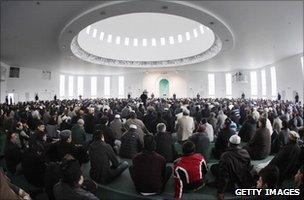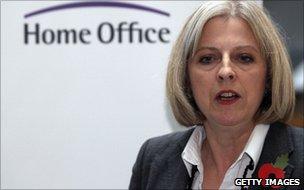Is fight against terror about violence or extremism?
- Published
- comments

Muslims Gather To Condemn Extremism In The UK At Baitul Futuh Mosque
Everyone is against violent extremism, right?
But what about plain extremism? That is the question at the heart of the government's review of its Prevent policy - the pre-emptive strand of Britain's counter-terrorism strategy.
The signs are that the remit is to be extended. "One of the things we were very clear about here at the Home Office", Theresa May explained this weekend, external, "was we needed to look at extremism, not just violent extremism".
They may be clear about it in the Home Office, but there are many voices within Parliament and within the coalition who worry where this policy may lead.
When a committee of senior MPs reported on the Prevent policy last year, external there was a clear warning.
"Holding extreme views is not illegal and Prevent should clearly focus on violent extremism" the MPs said.
They worried that by marginalising 'radical' but non-violent opinions, Government effectively pushes those groups beyond the democratic process. "No organisation, unless proscribed," the committee concluded, "should be excluded from debate and discussions."
'Lazy indifference'
The same argument was made by the Deputy Prime Minister Nick Clegg last March, external. "Smart engagement" he said, means "distinguishing between violent and non-violent extremism". Organisations and individuals may hold deeply unpalatable, illiberal views, he noted, "but you don't win a fight by leaving the ring".
The context of this philosophical debate is, of course, the tangible threat from Al-Qaeda inspired terrorism. When the Prevent policy was introduced by the last Labour government, the issue was the same - should Government work with or against radical but non-violent voices within Muslim communities?
Five years ago Communities Secretary Ruth Kelly said, external she would focus funding on those groups who "are determined to take on the extremists and defend values that the vast majority of us share".
Theresa May has said something almost identical in the last couple of days: "We are looking at a set of values we believe we have here in the UK and those people opposed to those values are people who the Government won't be funding or engaging with".

The government is taking a gamble by conflating the issues
Critics warn such a policy risks achieving the opposite of its aim - that those organisations excluded gain credibility by being seen to be challenging secular liberal Western culture, while those given a governmental tick of approval lose credibility.
Last year's report on Prevent put it this way: "The Government's current approach to engagement with Muslim organisations has given the impression that there are 'good' and 'bad' forms of Islam - some endorsed by the Government, others not," the MPs noted. "Government interference in theological matters must be avoided."
David Cameron spoke recently, external of how, at the root of the problem, are Muslims who may reject violence but "who accept various parts of the extremist worldview including real hostility towards Western democracy and liberal values".
A recent report, external by Robert Lambert and Jonathan Githens-Mazer from the European Muslim Research Centre at the University of Exeter accused the Prime Minister of a "lazy indifference" to the range of groups and movements within Islamic activism.
"It is the equivalent to saying that any form of right leaning politics succours fascism, and not bothering to disaggregate the historical trajectories of organisations such as the Tory Party, the US Republican Party, France's Front Nationale and Mussolini's Black Shirts."
The government's gamble is that by conflating the threat from terrorism and Islamism in the same breath, that expanding the target from stopping illegality to silencing ideology, that making it about values rather than simply violence, Prevent becomes more effective in preventing terrorism. There are many who worry it may make matters worse.